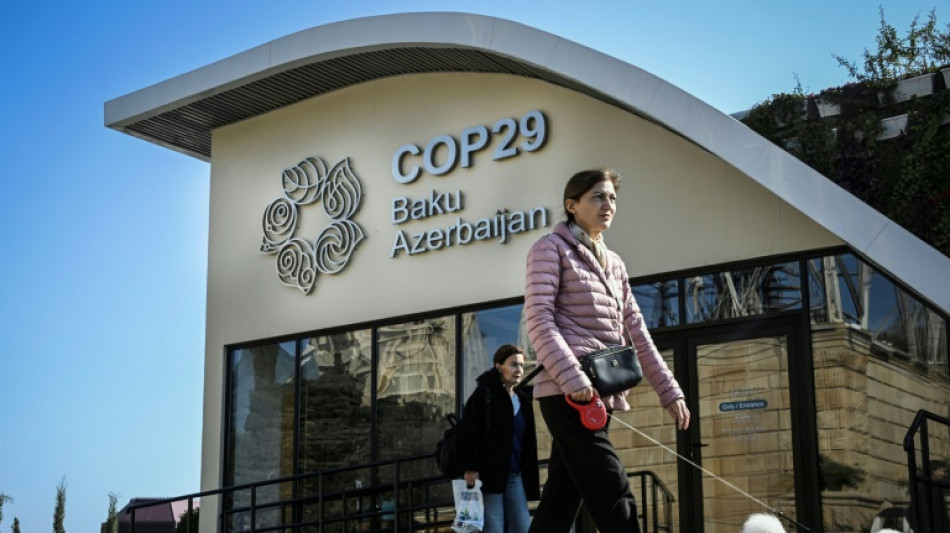
SCS
0.0200

The COP29 talks opened Monday with calls for global cooperation and fresh warnings about climate disasters -- but proceedings quickly ground to a halt in a fight over the agenda.
Donald Trump's re-election is already hanging over the talks in Baku where negotiators are meant to agree new funding for climate action in poorer countries.
As they opened, UN climate chief Simon Stiell told countries: "Now is the time to show that global cooperation is not down for the count."
And he warned rich countries struggling to agree a new funding target to "dispense with any idea that climate finance is charity."
"An ambitious new climate finance goal is entirely in the self-interest of every nation, including the largest and wealthiest."
But the official proceedings in the capital of oil- and gas-rich Azerbaijan stalled almost immediately.
"They're not going to resume until they resolve... the agenda," said Alden Meyer, senior associate at climate change think tank E3G.
The COP29 president "can't put negotiating teams to work" until they adopt it, he added.
- Trillions needed -
Negotiators must increase a $100 billion-a-year target to help developing nations prepare for worsening climate impacts and wean their economies off fossil fuels.
How much will be on offer, who will pay, and who can access the funds are some of the major points of contention.
Developing countries are pushing for trillions of dollars and insist money should be mostly grants rather than loans, but negotiators are tight-lipped over what final figure might emerge.
COP29 President Mukhtar Babayev acknowledged the need was "in the trillions" but said a more "realistic goal" was somewhere in the hundreds of billions.
"These negotiations are complex and difficult," the former executive of Azerbaijan's national oil company said at the opening of the summit.
Developing countries warn that without adequate finance, they will struggle to offer ambitious updates to their climate goals, which countries are required to submit by early next year.
"The global North owes the global South a climate debt," said Tasneem Essop, executive director of Climate Action Network.
"We will not leave this COP if the ambition level on the finance... doesn't match the scale at which finance must be delivered."
- Few G20 leaders -
The small group of developed countries that currently contributes the money wants the donor pool expanded to include other rich nations and top emitters, including China and the Gulf states.
That is firmly rejected by Beijing, with one Chinese official warning Sunday during a closed-door session that the talks should not aim to "renegotiate" existing agreements.
Just a handful of leaders from the Group of 20, whose countries account for nearly 80 percent of global emissions, are attending. US President Joe Biden is staying away.
Afghanistan will however be sending a delegation for the first time since the Taliban took power. They are expected to have observer status.
Diplomats have insisted that the absences, and Trump's win, will not detract from the serious work at hand.
The talks come with fresh warnings that the world is far off track to meet the goals of the Paris agreement.
The UN said Monday that 2024 is on track to break new temperature records, and the Paris climate agreement's goals were now "in great peril".
- Warmest decade -
The period from 2015 to 2024 will also be the warmest decade ever recorded, the UN's World Meteorological Organization said in a new report.
The climate deal commits to keep warming below 2 degrees Celsius compared to pre-industrial levels, preferably below 1.5C.
If the world tops that level this year, it would not be an immediate breach of the Paris deal, which measures temperatures over decades.
But it suggests much greater climate action is needed.
Last month, the UN warned the world is on a path towards a catastrophic 3.1C of warming this century based on current actions.
More than 51,000 people are expected at the talks, which run from November 11 to 22.
For the second year running the talks will be hosted by a country heavily reliant on fossil fuels, after the United Arab Emirates last year.
Azerbaijan has also been accused of stifling dissent by persecuting political opponents, detaining activists and suffocating independent media.
Y.I.Hashem--DT